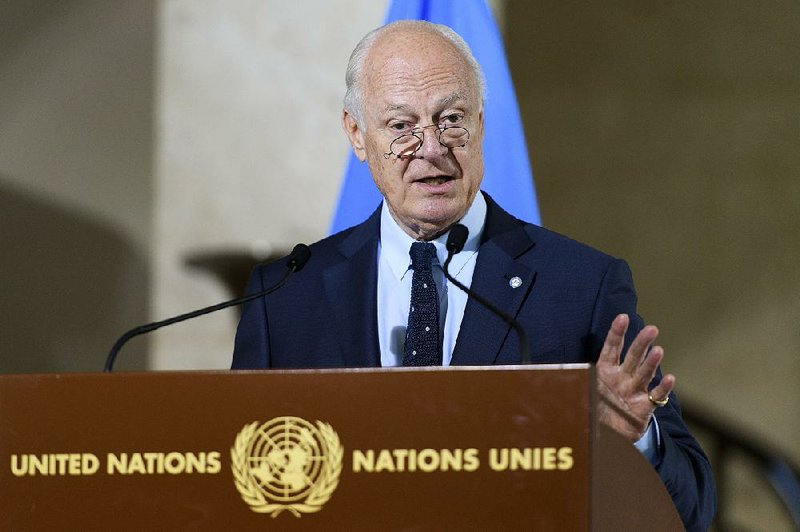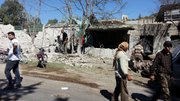GENEVA -- The United Nations special envoy for Syria on Friday urged Russia to leave the creation of humanitarian corridors around Aleppo to the U.N. and its partners.
In comments carried later Friday by Russia's Interfax news agency, Deputy Defense Minister Anatoly Antonov said Russia was willing to work with the U.N. on setting up the corridors. He said Russia is "ready for close and constructive cooperation with all international humanitarian organizations and, of course, with the office of the U.N. special envoy on Syria."
Rights groups and civilians trapped in opposition-held neighborhoods in eastern Aleppo have reacted critically to Russia's plan, saying it does not guarantee safe passage or give residents a choice of where they can flee. Some residents fear the proposed corridors are intended to restore government control over parts of the city that have been in rebel hands since 2012.
U.N. envoy Staffan de Mistura said he was not consulted on the proposal, which was first announced Thursday by the Russian Defense Ministry.
"That's our job," de Mistura said of the corridors plan at a news conference in Geneva. He expressed support "in principle" for humanitarian corridors but said it must be "under the right circumstances."
"How do you expect people to walk through a corridor -- thousands of them -- while there is shelling, bombing, fighting?" de Mistura said.
"The clock is ticking for the Aleppo population," he said. The U.N. says Aleppo is now possibly the largest besieged area in Syria, with an estimated 300,000 residents trapped inside.
Robert Mardini, Middle East director for the International Committee for the Red Cross, said those who choose to stay in Aleppo must be protected and that all parties must allow humanitarian agencies to reach them.
"Humanitarian corridors need to be well and carefully planned, and have to be implemented with the consent of parties on all sides," Mardini said. He said he had no indication that all involved groups had agreed to the plan.
With airstrikes on Aleppo continuing, the Russian proposal seems more like an effort to "depopulate Aleppo City in preparation for concerted pro-regime ground operations to force the surrender of opposition groups within the city," the Institute for the Study of War said in a brief.
Late-night airstrikes in the city killed at least six people, the activist-run Aleppo Media Center said Friday.
Osama Abo Elezz, a general surgeon from Aleppo who was stranded in Turkey because of the siege, said the humanitarian-corridor proposal serves the interests of the Syrian government and their Russian allies and "forces people to go to areas they don't want to go to."
He said that if the U.N. allows residents to travel safely to other opposition-held areas, this could reassure people that it is safe to leave, reducing casualty numbers.
There were no reports of civilians using the corridors Friday. Rebel fighters were forbidding people from using the Bustan al-Qasr crossing in the north of the city "out of fear for their safety," said Khaled Khatib, a volunteer for the civil defence search-and-rescue brigade. He said civilians who leave the city risk being shot by government snipers or being detained because of their opposition sympathies.
Also Friday, in neighboring Idlib province, the charity Save the Children said a maternity hospital it supports in the opposition-held area had been hit with three airstrikes. One struck the entrance, killing two men, said AbdulKarim Ekzayez, health coordinator at Save the Children International.
He said reports from the hospital suggest six or seven people were injured, though he could not yet give precise figures. A lot of equipment, including incubators for newborns, was damaged.
The Britain-based Syrian Observatory for Human Rights said airstrikes in Kafr Takhareem village in Idlib hit a hospital and a center for civil defense volunteers. It said the hospital was no longer operational.
The Observatory said an Islamist militant was believed to have been killed in the attack. Syrian state TV said government warplanes carried out an airstrike in the same area, also claiming a senior Islamist militant had been killed without naming him.
Amnesty International said the aerial attack "appears to be part of a despicable pattern of unlawful attacks deliberately targeting medical facilities," which can amount to a war crime.
Save the Children said the maternity hospital is the only such facility in the region, with the closest one about 45 miles away.
In other violence, activists said a U.S.-led coalition airstrike targeting a village in northern Syria held by the Islamic State extremist group killed 28 civilians, including seven children.
The Observatory said coalition airstrikes hit the Islamic State-held village of Al-Ghandour late Thursday. It said another 13 people were killed in the strikes, but that it was unclear whether they were Islamic State fighters or civilians.
The international coalition had no immediate comment on the casualty figures. The bombings came a week after airstrikes, also blamed by Syrian activists on U.S. aircraft, killed at least 56 civilians in Islamic State-held territory in northern Syria.
Al-Ghandour is 15 miles northwest of the city of Manbij, a key hub in the extremist group's Syria network and a supply route to the Islamic State's self-declared capital of Raqqa.
The Manbij area has seen extensive battles between Islamic State extremists and U.S.-backed Kurdish-led fighters, who have been advancing under the cover of airstrikes by the U.S.-led coalition. The town is encircled by the Kurdish-led Syrian Democratic Forces.
Activists said that Islamic State militants recaptured the nearby village of al-Bouweir on Thursday and killed 24 civilians.
Hamoud Almousa, a founding member of activist group Raqqa is Being Slaughtered Silently, said the Islamic State sought retribution from the village for "not defending Islam" when the Democratic Forces initially drove out the Islamic State earlier this summer.
Information for this article was conributed by Philip Issa of The Associated Press.
A Section on 07/30/2016



